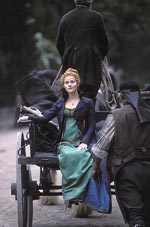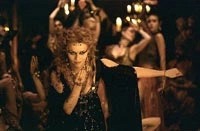It’s amazing the lengths to which some people will go to marry well—”well,” of course, being an absolutely subjective term. One needs only to look at the latest reality show debacle to realize this. But two turns of the century ago in London, the quest for a suitable suitor was more than a matter of TV fodder, tax breaks, and finally being able to get nagging family members off your back. Back then, at least in author William Makepeace Thackeray’s version of this time and place in history, marrying well was an art. And in his 700-page novel Vanity Fair, on which this Mira Nair (Monsoon Wedding) production is somewhat loosely based, Thackeray deconstructs and pokes fun at this process.
His main subjects are Amelia (Romola Garai), a young woman who’s well-bred, fiercely loyal, but not always altogether wise, and Becky (Reese Witherspoon), her finishing school friend who’s an orphan of dubious parentage and shameless social-climbing prowess. At least she’s a shameless social climber in Thackeray’s version of Vanity Fair. Witherspoon’s version of Becky is less conniving and more compelling, with her kind gestures and winning, blue-eyed enthusiasm about the world around her. What Witherspoon did for dumb blondes in Legally Blonde, she does here for social climbers.

Near the beginning of the movie, these two young women are turned loose from Miss Pinkerton’s Academy, where Amelia found love and support and Becky found unending chores and class-based disdain. Though they travel far and wide from this little institution, their reception wavers little. These friends first spend time with Amelia’s family, where Becky sets her sights on Amelia’s brother, Jos (Tony Maudsley), as a potential husband and a step up to a high rung on the social ladder. This foppish fellow immediately seems as taken with Becky as he is with food, which is saying a lot. But at a lavish Indian-themed picnic (the first of many parties of lush costumes and settings throughout the movie) George Osborne (Jonathan Rhys Meyers), Amelia’s intended, pulls his friend aside and discourages him from marrying someone of such low social standing.
So, still single and in search of her entrée into high society, Becky begins her next adventure, as governess for eccentric Sir Pitt Crawley (Bob Hoskins) and the hapless assortment of family members he houses in his dusty country estate. While Becky breathes new life into their home, it’s only when Crawley’s wealthy spinster sister, Matilda (Eileen Atkins), comes for a visit that Becky finds her true calling. She works her way into the amusingly cantankerous old woman’s good graces and earns an invite to go with her to London. It’s there that Becky secretly marries Crawley’s son, Rawdon (James Purefoy), a handsome military man—and the marriage gets them both spurned from the family. Though this marriage is quite the coup for Becky, she genuinely seems to love Rawdon, even without his family’s money.

It’s also in London that Becky runs into her friend Amelia, who’s still pining hopelessly for her cad of a fiancé George. While George’s father causes Amelia’s family financial ruin, he also secretly tries to marry him off to a woman of great wealth. In his only show of decency, George tells his father off and secretly marries Amelia, and act that gets him written out of the family. So even though they’ve had to do so on the sly, our two main characters are now finally wed to men of decent social standing, though both unions suffer from familial and financial strain. No matter: Becky seems to see every stumbling block or snide comment as a welcome challenge as she doggedly works her way to becoming the toast of the town.
The friends continue on parallel journeys as they both discover they’re pregnant, and shortly thereafter send their husbands off to war. During these trying times, delicate Amelia all but unravels, while plucky Becky seems to shine even brighter. Without giving too much away, suffice it to say that the rest of this 2-hour-and-17-minute film continues to follow their stories, the high and the lows.
One challenge of this flick, as you may have already picked up on, is the countless characters. While they’re all expertly played (especially Hoskins’ Crawley, whose frank and unkempt manner is refreshing amongst so much British propriety), keeping them all straight keeps you on your toes. And just when you think you have these figures figured out, many of them surprise you with a sudden uncharacteristic act of bravery or back-stabbing. Perhaps that’s because so many of the characters here are kinder, gentler versions of the Thackeray originals. It’s as if the writers occasionally said, “Oh yeah, Becky’s supposed to be calculating and cunning instead of just cute,” and then threw in a scene to prove as much. This is especially true of Becky toward the end of the movie.

It’s an intriguing character study, especially the way they all influence one another. George’s character would be altogether detestable if not for his loyal military pal William Dobbin (Rhys Ifans), who implores him repeatedly to put down the booze and go home to his wife, Amelia, whom Dobbin obviously adores more than his drunkard of a friend ever will. And pregnant Amelia would have come completely undone as London emptied during the war if not for Becky bravely staying behind with her friend. But for every positive influence, there are two negative ones, such as George’s cold-hearted and conniving father, who seems to see his son merely as property to be sold out for the highest profit. It’s no wonder George himself is so unlikable, and why he, in turn, dissuades poor Jos from marrying Becky. And when Becky turns to the mysterious Marquess of Steyne (Gabriel Byrne) for help in paying off her husband’s gambling debts and opening the doors to the highest echelons of London society, his influence on her life is stunning. There’s a subtle though stark moral here to be very choosy in whom you allow to influence your life.
Vanity Fair also offers an unflinching picture of the consequences for our choices. If you marry for money, you must live with the family that provides it. If you gamble away your measly resources, you must settle for meager food. If you pass up love because it doesn’t come with the right pedigree, you’ll remain alone. As Rawdon says to Becky when she gleefully tells him of an invite to a party that may open the door to the “right” social circles, “I know what we have to gain. I’m afraid of what we have to lose.” Vanity Fair also illuminates the way our obsessions—be they for gambling, social climbing, or a long-lost love—ultimately do us in. Sometimes, Thackeray and Nair seem to tell us, getting what you want is the worse consequence of all.

To our utter delight, these stories and messages are told with superb acting, amazing costumes that burst with color and texture, and dazzling locales in London, Bath, and Jodhpur. Unfortunately, the film’s brisk pace breaks down in the final 20 minutes, making a good movie suddenly seem like a long movie. The pacing becomes choppy, and the final dialogue between Becky and Amelia seems laughingly stilted. And for all this set-up with countless characters, lavish scenery and costuming, and time devoted to this twisting plot, the ending doesn’t satisfy. Key plot elements are mentioned in passing, and as with the secret weddings earlier in the movie, we don’t get the satisfaction of seeing other important events come to pass. The final scene of Vanity Fair is again a kinder, gentler diversion of the Thackeray rendition. Though on some levels it’s a pleasing plot twist (especially for romantics at heart), it mostly feels like a sudden left turn and an easy way out for a character whose demise has been completely self-inflicted.
While we’re mostly stunned at the lengths to which the characters go to gain money or prestige, considering the social and political climate of the day, it’s somewhat understandable. What’s perhaps even more stunning is comparing their antics to certain aspects of our current-day society and wondering how much has really changed. This is a question Thackeray, and to a lesser degree Nair, would no doubt love for us to ponder.
Talk About It
Discussion starters
- What do you think of Becky? Is she a clever girl doing what she can to survive, or a conniving social climber? Is there a certain point where she crosses the line from one to the other?
- Have you ever made a sacrifice for social standing? Was it worth it?
- Which of the characters do you admire most? Why? Which do you like least? Why?
- What do you make of Becky’s relationship with the Marquess of Steyne? Do you think she was right to accept his help?
- How do you think our society compares to the world of Vanity Fair? What’s different? What’s the same?
The Family Corner
For parents to consider
There are only a few scenes that may raise eyebrows. In one scene, Becky and her husband, Rawdon, are chatting in bed; they’re mostly clothed (he’s shirtless). In another scene, old Aunt Matilda stands up in shock in the middle of her bath and we get a brief glimpse of her backside. And there are a couple of extra-marital advances, done mostly through notes and kisses. They’re not at all salacious and could actually spark a good discussion about why these things are wrong. And being early 19th Century London, there are plenty of busty women showing cleavage.
Photos © Copyright Focus Features
What Other Critics Are Saying
compiled by Jeffrey Overstreet
from Film Forum, 09/02/04
In 2001, director Mira Nair delivered Monsoon Wedding, which critics said was a better “wedding” film than My Big Fat Greek Wedding. It showed up on several critics’ ten-best lists for that year.
Now, Nair is back with an adaptation of William Makepeace Thackeray’s Vanity Fair, with Reese Witherspoon in the lead role. The film opened on Wednesday this week, and thus only a few religious press reviews were published in time for inclusion in this column.
Steven D. Greydanus (Decent Films) calls it “An honorable failure. Nair’s warm humanism is a poor match for Thackeray’s borderline misanthropic tendencies, and in her hands the novel without a hero becomes a film about a heroine, with Becky eclipsing her literary costar Amelia. Thackeray said he wanted the end of his novel to leave readers dissatisfied and unhappy. Ironically, Nair’s very inability to embrace this goal may be precisely why she achieves it … though in a way not to her credit or the film’s.”
But Harry Forbes (Catholic News Service) says this is “one of the most satisfying” adaptations of the story. “This production is beautiful to look at. There’s a whole gallery of fine performances by a stellar British cast … but it’s the captivating Witherspoon, seemingly on screen almost every minute, who rivets your attention. Nair gives the story the epic sweep it deserves. Julian Fellowes … has written an intelligent screenplay in collaboration with Matthew Faulk and Mark Skeet, underscoring the theme: Who among us who achieves our desires is truly content?”
More religious press reviews will be posted in next week’s column. Mainstream critics are turning in mixed reviews here.
from Film Forum, 09/09/04
Last week, Film Forum marked the arrival of director Mira Nair’s adaptation of the novel by William Makepeace Thackeray, Vanity Fair, by posting links to early reviews at Catholic News Service and Decent Films.
Here are some more opinions from the Christian press:
Camerin Courtney (Christianity Today Movies) observes that “many of the characters here are kinder, gentler versions of the Thackeray originals.” She concludes, “There’s a subtle though stark moral here to be very choosy in whom you allow to influence your life. To our utter delight, these stories and messages are told with superb acting, amazing costumes that burst with color and texture, and dazzling locales. Unfortunately, the film’s brisk pace breaks down in the final 20 minutes, making a good movie suddenly seem like a long movie.”
Annabelle Robertson (Crosswalk) takes issue with the portrayal of Becky. “Thackeray portrayed Becky as a beautiful, scheming villain willing to do anything to succeed, and even subtitled his book ‘A Novel Without a Hero’ because Becky was an anti-heroine. Thackeray also structured his novel as a ‘compare-and-contrast’ between two women, Becky and Amelia, following the different paths their lives take over a 40-year period. Nair focuses instead on Becky, softening her into an ambitious but likeable gal who is simply trying to overcome poverty and ‘do better for herself.'”
She concludes that “trying to condense a 900-word novel into a film is no easy task, and while it drags at times, Nair’s effort is a good one.”
Marvin Olasky (World) reports, “The essential problem … is that this film makes [Becky] more hit upon than hitting. The novel’s Becky Sharp is essentially a villainess, preying on the seriously ill and sending men to their deaths. The movie’s Becky Sharp is a heroine, a poor but ambitious orphan who does what she has to do.” This change, Olasky notes, reflects “our general movement from emphasizing individual character to seeing individuals as stuck within a system and thus not responsible for their actions.”
Adam R. Holz (Plugged In) comments on the character: “Becky Sharp is an engaging and sympathetic figure, and we want her to reach her goal. At the same time, it becomes increasingly clear that Becky’s choices will result in the tragic loss of the relationships most dear to her.” He concludes, “Vanity Fair could be a good starting point for mature discussion about what matters most in life. It has much to offer thoughtful and patient viewers who are willing to talk about its messages and morals.”
Sheri McMurray (Christian Spotlight) finds it lacking. “Although done well with a beautiful emphasis on period costume and design, Vanity Fair left me wishing it had a richness to the fabric of it’s characters as well. Even though it was meant to be poignant it didn’t bring the viewer into the character’s lives as deeply as needed to truly sympathize with their plights.”
Michael Elliott (Movie Parables) writes, “Nair and her crew exceed expectations in how well they portray early 19th century England (as well as India, Germany and Brussels). The script … neatly condenses Thackeray’s 900-page epic to its key elements and although it does whitewash some of the more unsavory aspects of the tale, those decisions are well within the Victorian practice.”
Mainstream critics were almost evenly split over the film.
from Film Forum, 09/16/04
Kevin Miller (Hollywood Jesus) says, “As this film so clearly shows, without love, all is vanity. And despite all that she gains and loses, love is the one thing Becky seems incapable of either giving or receiving—unless it serves her purposes. I cannot think of a better illustration of Christ’s words in Mark 8:36, ‘And how do you benefit if you gain the whole world but lose your own soul in the process?'”
Copyright © 2004 Christianity Today. Click for reprint information.












